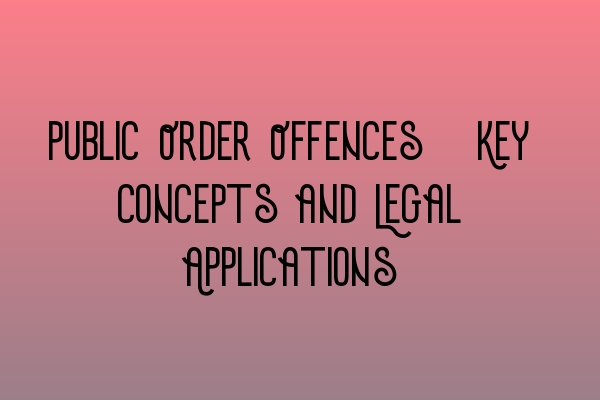Public Order Offences: Key Concepts and Legal Applications
Welcome to SQE Criminal Law & Practice Law UK! In this blog post, we will delve into the key concepts and legal applications of public order offences. Understanding these offences is essential for aspiring solicitors looking to excel in their legal careers. So, let’s get started!
What are Public Order Offences?
Public order offences encompass a wide range of behaviours that disrupt or disturb the peace and tranquillity of the public. These offences typically occur in public spaces and involve actions that may cause fear, alarm, or distress to others. Some common examples of public order offences include:
- Disorderly conduct
- Rioting and violent disorder
- Threatening or abusive behaviour
- Harassment
- Intentional public nuisance
- Incitement to racial or religious hatred
- Breach of peace
Each public order offence has its own set of legal elements and penalties, as outlined in the Public Order Act 1986. It is crucial for solicitors to familiarize themselves with these elements to effectively represent their clients and build strong cases.
Legal Applications of Public Order Offences
Public order offences can arise in various situations and contexts. Here are some notable legal applications:
Protests and Demonstrations
Protests and demonstrations are an important aspect of democratic societies. However, when these events turn violent or disruptive, they can cross the line into illegal territory. Solicitors need to navigate the complex legal framework surrounding protests to protect the rights of their clients and ensure compliance with the law.
Football Matches and Sporting Events
Football matches and other sporting events often attract passionate fans. However, emotions can run high, leading to potential public order offences. Solicitors may be involved in cases related to hooliganism, pitch invasions, or incitement to violence. Understanding the specific laws and regulations governing these events is crucial for solicitors working in this area.
Online Behaviour and Hate Speech
In the digital age, public order offences extend beyond physical spaces. Online platforms have become breeding grounds for offensive, threatening, or abusive behaviour. Solicitors must navigate the complexities of online law to tackle cases related to cyberbullying, hate speech, and harassment.
Key Concepts to Consider
When dealing with public order offences, solicitors should keep the following key concepts in mind:
Mens Rea and Actus Reus
Mens rea refers to the mental element or intention behind the offence, while actus reus refers to the physical act or conduct. Solicitors must analyze these elements to establish the client’s state of mind and the actions they undertook.
Defences and Mitigating Factors
Public order offences may have defences or mitigating factors that could reduce the severity of the charges or even result in acquittal. Solicitors need to explore all possible defences, such as self-defense, lawful authority, or mistake of fact, to protect the interests of their clients.
Conclusion
Public order offences pose unique challenges for solicitors, requiring a deep understanding of the law and its applications. By familiarizing themselves with key concepts and staying up-to-date on relevant legislation, aspiring solicitors can successfully navigate public order cases and provide the best legal representation to their clients.
For more information on related legal topics, check out our other informative articles:
- SQE Exam Prep: Essential Study Materials for Aspiring Solicitors
- Expert Testimonies in UK Courts: Building Strong Cases
- Demystifying the Solicitors Qualifying Examination Format
- SQE Exam for International Lawyers: Challenges and Success Strategies
- LLC Formation Made Simple: Step-by-Step Guide for UK Entrepreneurs
Thank you for reading! If you have any questions or require legal assistance, please contact SQE Criminal Law & Practice Law UK.
